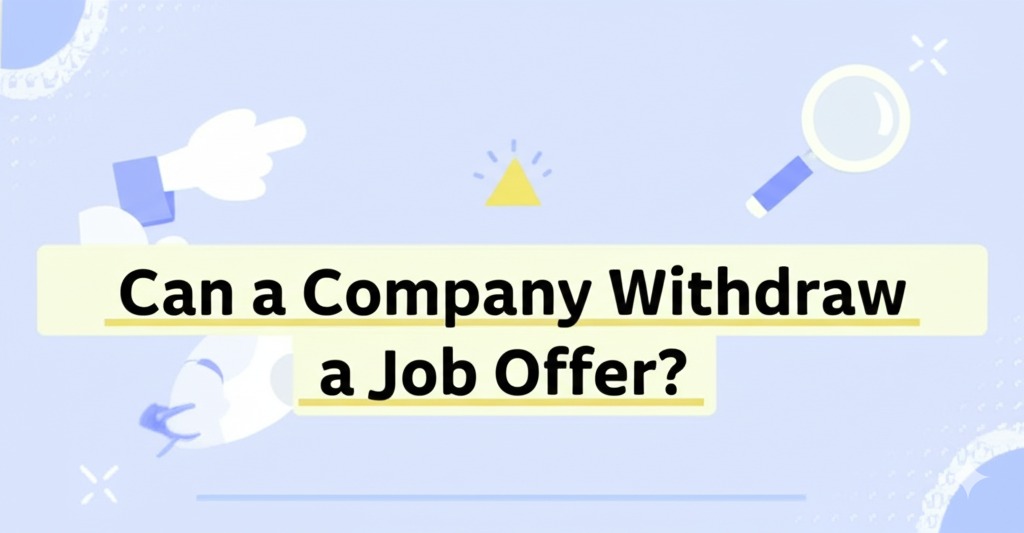
Introduction
Receiving a job offer is often a thrilling moment in a job seeker’s career journey. After months of job hunting, interviews, and networking, the long-awaited email or phone call confirming an offer can feel like the end of a challenging chapter. However, what if that offer is suddenly withdrawn? It’s a question many candidates have wondered about, especially in today’s ever-evolving job market. In this article, we’ll explore whether a company can legally and ethically withdraw a job offer, the common reasons behind it, and what to do if you find yourself in this unfortunate situation.
Understanding Job Offers and Withdrawals
What is a Job Offer?
A job offer is a formal proposal made by an employer to a candidate, typically after successful interviews and assessment. It includes terms of employment such as salary, benefits, start date, and job role. At this stage, the candidate is expected to accept or decline the offer.
Can a Company Legally Withdraw a Job Offer?
Yes, a company can withdraw a job offer in certain circumstances, but there are limitations. The key question lies in whether a legally binding contract was formed.
- Before Acceptance: If the candidate has not formally accepted the offer—either by signing a contract or explicitly agreeing to the terms—the offer is typically considered an invitation to enter into a contract. In this case, an employer can legally withdraw the offer without facing significant legal consequences.
- After Acceptance: If the candidate has accepted the offer in writing, a contract may have been formed. With a formal agreement in place, withdrawing the offer becomes more complicated. Depending on the jurisdiction and the terms of the offer, the employer could be legally obligated to honor the agreement, and the candidate might be entitled to damages.
Ethical Considerations in Withdrawing a Job Offer
While legal matters are important, ethical considerations often play a significant role in the decision to withdraw a job offer. Employers must take care not to engage in bad faith practices, such as making promises they never intended to keep. Withdrawing an offer after an agreement has been made can damage the company’s reputation and trust with candidates. Therefore, it’s always advisable for companies to act with transparency and honesty throughout the hiring process.
Common Reasons for Withdrawing a Job Offer
1. Background Check or Reference Issues
Employers conduct background checks and reference verifications to ensure that the candidate is a good fit for the role. If something negative comes up—such as discrepancies in the candidate’s resume, criminal history, or unfavorable references—the company might withdraw the job offer.
2. Business or Economic Changes
Sometimes, changes in a company’s financial situation or business priorities can lead to the withdrawal of a job offer. If a company is facing budget cuts, restructuring, or a sudden shift in market conditions, they may have to retract an offer as part of cost-saving measures.
3. The Candidate’s Actions
In some cases, a candidate’s behavior after the job offer could cause the employer to reconsider. For instance, if the candidate becomes difficult to communicate with, behaves unprofessionally, or engages in actions that raise doubts about their reliability or suitability for the role, the company may choose to withdraw the offer.
4. Failure to Meet Pre-Employment Requirements
Many companies include a list of pre-employment conditions such as drug testing, medical exams, or proof of specific qualifications. If the candidate fails to meet these requirements, the job offer may be rescinded.
What to Do If Your Job Offer Is Withdrawn
1. Stay Calm and Professional
It can be incredibly frustrating to have a job offer withdrawn, but it’s crucial to remain calm and professional. Take time to process your emotions, but avoid reacting impulsively or angrily. Responding respectfully keeps the door open for potential opportunities in the future.
2. Ask for Feedback
If the reason for the withdrawal isn’t clear, consider politely asking the employer for feedback. Understanding why the offer was rescinded can help you avoid similar situations in the future and learn from the experience. However, keep in mind that some employers may not be willing to provide detailed reasons.
3. Review Your Legal Options
If you believe the company acted unfairly or illegally, it might be worth consulting a legal expert. A lawyer can help you understand whether the employer violated any employment laws or whether there is an opportunity for legal recourse.
4. Move Forward and Stay Positive
While being in this situation is undoubtedly disappointing, it’s essential to stay optimistic. Take the experience as a learning opportunity and continue your job search. Rejection or a withdrawn offer doesn’t define your value or career trajectory.
Preventing Job Offer Withdrawal
1. Ensure Clear Communication During the Hiring Process
To avoid misunderstandings and potential offer withdrawals, both parties should communicate clearly throughout the hiring process. As a candidate, make sure you confirm key details of the offer in writing. Employers should also ensure that all terms are clearly outlined and agreed upon before extending an offer.
2. Verify Qualifications and Expectations Early
Both the employer and the candidate should make sure expectations are aligned from the beginning. Candidates should double-check that they meet the job qualifications and are clear about the job role. Employers, in turn, should verify that they’re hiring someone who is suitable for the role before making an offer.
3. Understand Contingencies in Job Offers
Sometimes, a job offer will be contingent on specific factors, such as background checks or reference verifications. Candidates should understand that an offer isn’t guaranteed until all contingencies are met, and employers should make these conditions clear upfront.
Conclusion
While it’s certainly unsettling, a company can withdraw a job offer under certain circumstances. Understanding the factors that can lead to such a decision—from background checks to changes in business conditions—can help candidates better navigate the hiring process. If you find yourself in a situation where a job offer is withdrawn, remember to stay professional, seek feedback, and keep pushing forward in your job search.

Andre Cuevas provides career insights, job search strategies, and professional advice to help individuals navigate the job market and achieve their career goals.





